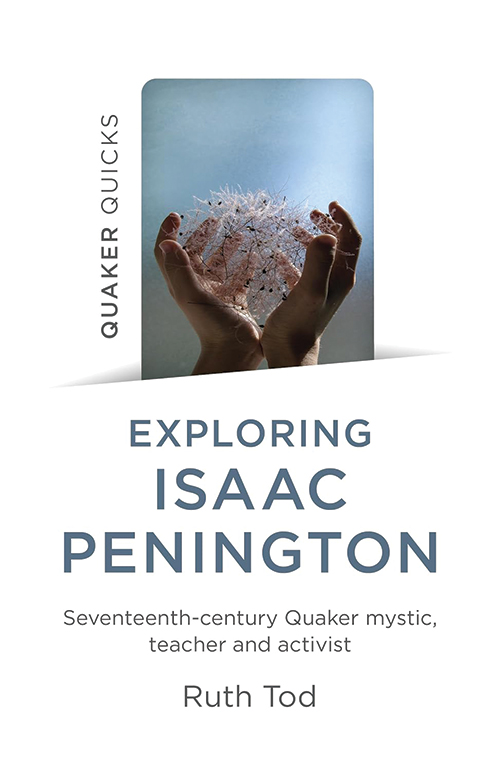
Exploring Isaac Penington: Seventeenth-Century Quaker Mystic, Teacher and Activist
Reviewed by Bob Dixon-Kolar
April 1, 2024
By Ruth Tod. Christian Alternative Books (Quaker Quicks), 2023. 88 pages. $10.95/paperback; $5.99/eBook.
I never devoted much time to reading the written works of Isaac Penington. Although I felt a kinship with his profound awareness of God’s presence, I could not engage with his writings. They felt remote and archaic to me. Ruth Tod’s instructive book Exploring Isaac Penington: Seventeenth-Century Quaker Mystic, Teacher, and Activist connects me to this historic Friend’s life and spiritual vision in ways that I appreciate.
Tod, a lifelong British Friend, divides her book into three parts. In the first part, she shares her educational and spiritual journey. Raised in a Quaker family, she attended meeting every Sunday. In communal worship, she experienced the power of silent, patient listening. She writes: “We wait upon the still voice within us, trusting that in the silence we are creating a sacred space.” This contemplative practice set her social activism upon a firm, prayerful basis, giving it direction and inner strength. Along with fellow peacemakers, Tod worked for humanitarian causes, not, in her words, “arming ourselves against others, but disarming others with kindness, listening and respectfulness.”
After telling her story, she relates that of Isaac Penington’s. She recounts the dramatic political events in England in the 1600s, most crucially the execution of King Charles I, which formed conditions allowing early Quakerism to flourish. Within this tumultuous, religious world, where Friends endured persecution and imprisonment, Penington helped the Quaker movement grow. He achieved this through the outward testimony of his Spirit-led life, through the books and pamphlets he authored, and through his many letters of counsel to friends and family. His wife, Mary, greatly aided in his work. Her remarkable financial and organizational talents warrant their own exploration in a book.
In the second part, Tod examines the teachings and beliefs of this influential Friend. Her aim, she writes, “is to share and comment on some of Penington’s writings from [her] personal perspective,” adding that his “writings are so rich that, as is the way of Quakers, you may well interpret them differently.” To illustrate the ways of God, Penington would clothe his ideas in metaphors drawn from nature. Invoking the image of refreshing water, he asks Friends if they can “feel the life and power flowing in upon [them] from the free fountain?” He often speaks of seeds: “For grace is a spiritual, inward thing, a holy seed and is sown by God and springs up in the heart.” He draws also upon bodily metaphors. Breathing is his image for praying: “Prayer is the breath of the living child to the Father of Life.” The human heart is his image of our richest holder of life. To a parent he writes: “There is a pure principle of life in the heart, from whence all good springs. . . . Mind therefore [God’s] leadings in thy heart and wait to be acquainted with its voice there.” To explore Isaac Penington so concretely makes his centuries-old writings very approachable.
Tod devotes the third part of Exploring Isaac Penington to her own reflections on the images and concepts introduced earlier in the book. At the close of each reflection chapter (six reflections in all), there are experiential exercises that invite a reader to encounter and examine these images, allowing them to flow through one’s body, breath, memories, and imagination. Some of Tod’s exercises derive from her training in the Alexander Technique, a therapeutic practice that centers upon mindful movement.
The word “disarming,” quoted above, describes Tod’s gracious writing style. It’s evident throughout her book that she regards our suffering world with love and empathy. Her compassion is sustained by divine joy. She writes that joy “helps turn anger and frustration into a positive energy that draws people in.” By opening herself to joy, in the midst of adversity, she softens the impact of sadness and uncertainty and can “welcome life.”
Tod introduces a surprising notion: “performing joy.” This phrase captures well, I think, what many Friends will find helpful in Exploring Isaac Penington. Yes, joy is an inward fruit of the Spirit; yet it is also an energizing act. To perform joy is to unite contemplative listening with dynamic, caring activism.
Bob Dixon-Kolar is an emeritus professor of English. He and his family are members of Evanston (Ill.) Meeting.



Comments on Friendsjournal.org may be used in the Forum of the print magazine and may be edited for length and clarity.